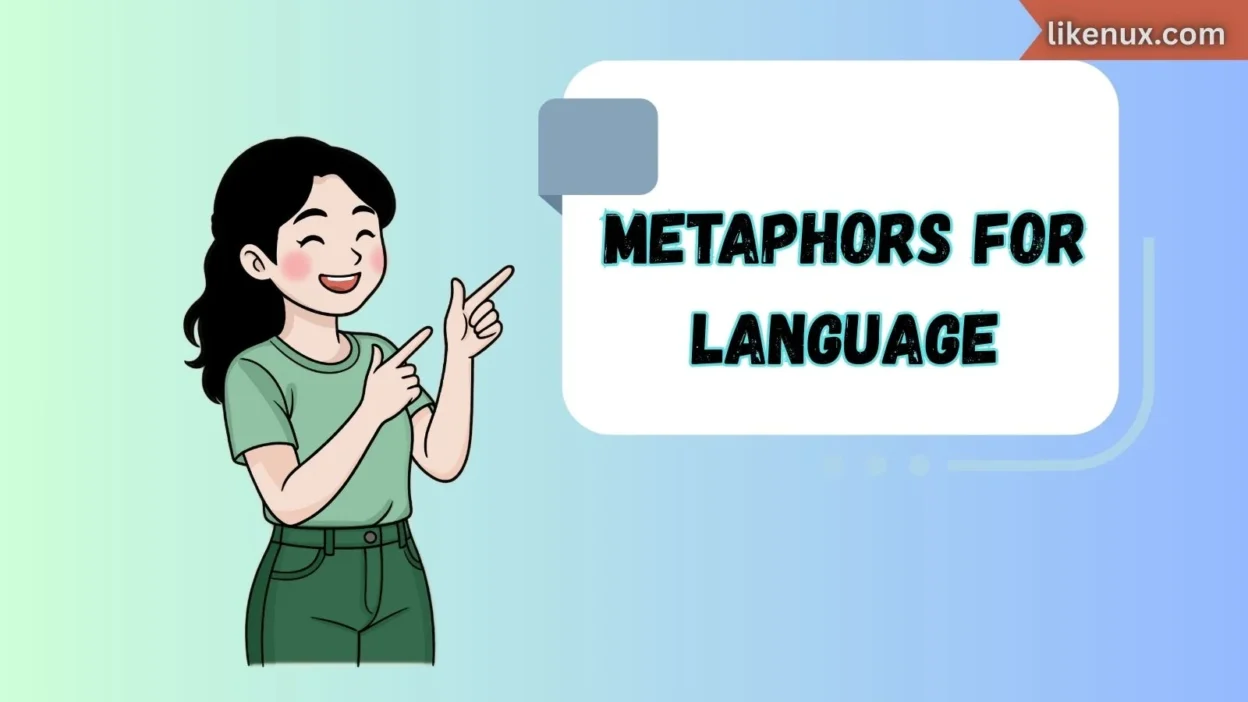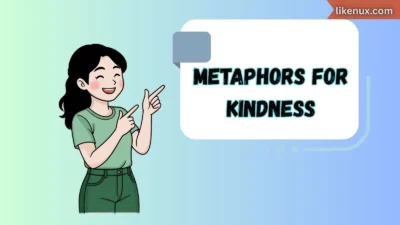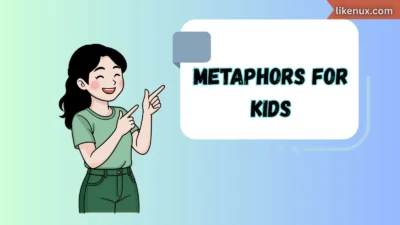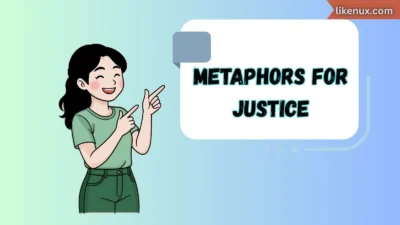Language is more than just words and grammar—it is the bridge that connects our thoughts, emotions, and ideas to the world. When we try to describe language itself, metaphors help us see its beauty and power in new ways. In this article, I’ll share 25 thoughtful metaphors for language that will not only spark your imagination but also help you express yourself with warmth, clarity, and care.
I’ve personally experienced how metaphors can transform ordinary conversations into meaningful exchanges. As someone who loves both teaching and writing, I’ve found that describing language through metaphors often makes learning easier, deeper, and more memorable. Let’s explore these 25 metaphors together.
1. Language is a Bridge
Meaning: It connects people, cultures, and hearts.
In a sentence: “Language is a bridge that unites us across distances.”
Best use: To express the unifying power of communication.
Other ways to say: Connector, pathway, link.
2. Language is a Mirror
Meaning: It reflects who we are.
In a sentence: “Our language is a mirror of our values and traditions.”
Best use: When highlighting how speech shows identity.
Other ways to say: Reflection, echo, looking glass.
3. Language is a Key
Meaning: It unlocks knowledge and understanding.
In a sentence: “Language is the key that opens the doors of learning.”
Best use: To show access to wisdom or opportunities.
Other ways to say: Passcode, opener, gateway.
4. Language is a Garden
Meaning: It grows with care and creativity.
In a sentence: “Language is a garden, blossoming with expression.”
Best use: To describe nurturing and growth.
Other ways to say: Orchard, field, landscape.
5. Language is a Map
Meaning: It guides us through thoughts and ideas.
In a sentence: “Language is a map that helps us navigate human experience.”
Best use: To describe direction and understanding.
Other ways to say: Guide, compass, chart.
6. Language is Music
Meaning: It carries rhythm, melody, and emotion.
In a sentence: “Language is music to the soul of communication.”
Best use: For poetic and emotional description.
Other ways to say: Symphony, harmony, tune.
7. Language is a Tool
Meaning: It helps us build and create.
In a sentence: “Language is the tool that crafts human connection.”
Best use: When emphasizing practicality.
Other ways to say: Instrument, device, mechanism.
8. Language is a Weapon
Meaning: It can harm or defend.
In a sentence: “Language is a weapon that can wound or heal.”
Best use: To highlight the power of words.
Other ways to say: Sword, shield, force.
9. Language is a Road
Meaning: It takes us on journeys of discovery.
In a sentence: “Language is a road leading to new perspectives.”
Best use: To describe progress and exploration.
Other ways to say: Path, highway, trail.
10. Language is a River
Meaning: It flows, changes, and adapts.
In a sentence: “Language is a river, ever-moving and reshaping.”
Best use: For evolution and adaptability.
Other ways to say: Stream, current, tide.
11. Language is a Flame
Meaning: It sparks inspiration and passion.
In a sentence: “Language is a flame that lights our imagination.”
Best use: To emphasize creativity.
Other ways to say: Fire, spark, torch.
12. Language is a Treasure Chest
Meaning: It holds valuable knowledge and stories.
In a sentence: “Language is a treasure chest of wisdom.”
Best use: When describing richness.
Other ways to say: Vault, collection, gem box.
13. Language is a Puzzle
Meaning: It requires effort to piece together.
In a sentence: “Language is a puzzle that challenges our minds.”
Best use: To show complexity.
Other ways to say: Riddle, mystery, enigma.
14. Language is a Lens
Meaning: It shapes how we see the world.
In a sentence: “Language is a lens that colors our perception.”
Best use: When discussing perspective.
Other ways to say: Filter, frame, viewpoint.
15. Language is a Shelter
Meaning: It offers comfort and belonging.
In a sentence: “Language is a shelter where we find community.”
Best use: To describe safety in words.
Other ways to say: Haven, home, refuge.
16. Language is a Ladder
Meaning: It helps us climb to new heights.
In a sentence: “Language is a ladder to success and understanding.”
Best use: For growth and opportunity.
Other ways to say: Stairway, step, rise.
17. Language is a Window
Meaning: It opens views to different worlds.
In a sentence: “Language is a window into culture.”
Best use: To emphasize cultural discovery.
Other ways to say: Doorway, portal, opening.
18. Language is a Thread
Meaning: It weaves people and stories together.
In a sentence: “Language is a thread that stitches generations.”
Best use: To describe connection.
Other ways to say: Fiber, string, cord.
19. Language is a Seed
Meaning: It grows into ideas and change.
In a sentence: “Language is a seed planted in fertile minds.”
Best use: For inspiration and beginnings.
Other ways to say: Root, sprout, germ.
20. Language is a Journey
Meaning: It evolves over time with us.
In a sentence: “Language is a journey of lifelong learning.”
Best use: To show progression.
Other ways to say: Voyage, expedition, adventure.
21. Language is a Currency
Meaning: It holds value in exchange and communication.
In a sentence: “Language is a currency that buys understanding.”
Best use: To highlight worth and trade.
Other ways to say: Coin, medium, asset.
22. Language is a Stage
Meaning: It gives us a place to perform and share.
In a sentence: “Language is a stage for our thoughts and stories.”
Best use: To describe expression.
Other ways to say: Platform, arena, setting.
23. Language is a Web
Meaning: It connects everything intricately.
In a sentence: “Language is a web linking human experiences.”
Best use: To show interconnectedness.
Other ways to say: Network, net, lattice.
24. Language is a Mirror of Time
Meaning: It changes with history and culture.
In a sentence: “Language is a mirror of time, reflecting eras gone by.”
Best use: When talking about history.
Other ways to say: Chronicle, record, diary.
25. Language is an Ocean
Meaning: It is vast, deep, and full of mysteries.
In a sentence: “Language is an ocean of endless expression.”
Best use: To describe depth and magnitude.
Other ways to say: Sea, expanse, abyss.
FAQs
1. Why do we use metaphors to describe language?
Because metaphors simplify complex ideas and make them relatable.
2. How can metaphors improve communication?
They create imagery that resonates emotionally, making messages more memorable.
3. Are metaphors useful for learning new languages?
Yes, they help learners connect abstract concepts with familiar images.
4. Can metaphors change across cultures?
Absolutely, metaphors often reflect cultural values and perspectives.
5. How do metaphors shape our thinking?
They influence how we interpret and frame experiences in daily life.
Conclusion
Language is not just a tool—it is a living, breathing force that connects, inspires, and shapes our world. These 25 metaphors remind us that communication is powerful, delicate, and deeply human. By seeing language as bridges, gardens, rivers, or oceans, we learn to value not just words but the emotions, histories, and relationships behind them.
I’ve found in my own life that the more I view language through metaphors, the more I appreciate its richness. Whether you’re a student, teacher, or lifelong learner, may these metaphors help you express yourself with warmth, clarity, and care.

Andrew Christopher is a passionate visionary who blends creativity with purpose to bring ideas to life. With a focus on innovation and integrity, he inspires growth and lasting impact.



